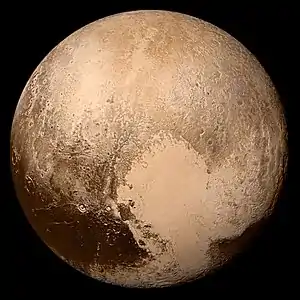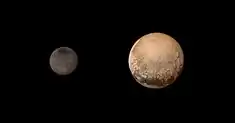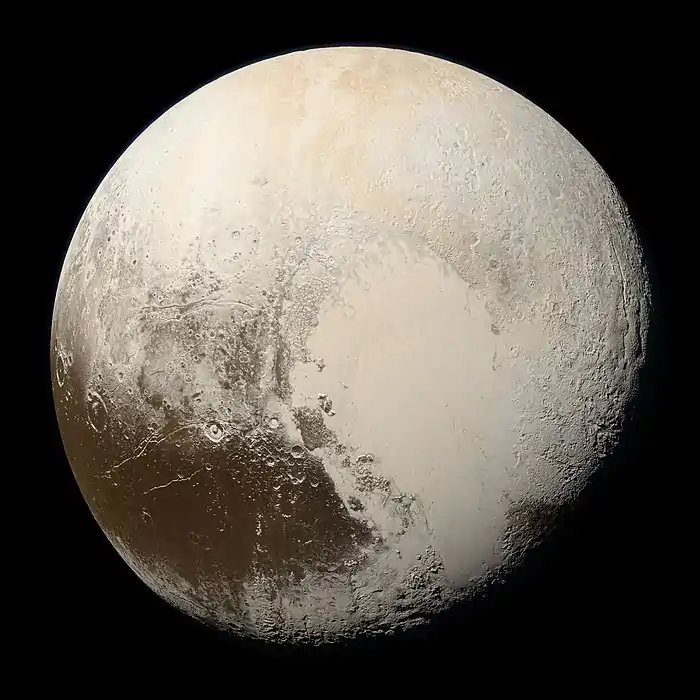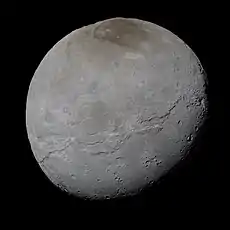Pluto in fiction
Pluto has been featured in many instances of science fiction and popular culture. Initially classified as a planet upon its discovery in 1930, Pluto has also received considerable publicity following a 2006 definition of planet decree (which reclassified it as a dwarf planet) and from the flyby of the New Horizons space probe in July 2015.

Near-true-colour image mosaic of Pluto taken by the New Horizons spacecraft on 14 July 2015 from a distance of 450,000 kilometers
Literature
- In H.P. Lovecraft's 1931 novella "The Whisperer in Darkness" (1931), the ninth planet of the Sol system is called Yuggoth and serves as a base for aliens called the Mi-go. Lovecraft was in the midst of writing the story when Pluto was found. Yuggoth as a concept predates Pluto's discovery. In other stories in what August Derleth would name "the Cthulhu Mythos", Yuggoth is a huge world situated beyond Pluto on an orbit perpendicular to the ecliptic.
- The short story "In Plutonian Depths" by Stanton A. Coblentz (Wonder Stories Quarterly, Spring 1931) is the first known story taking place on the newly named and discovered world.
- In "The Red Peri" (1935) a novella by Stanley G. Weinbaum, the titular character is a space pirate with a secret base on Pluto.
- Cosmic Engineers (1939, 1950), a novel by Clifford D. Simak, features a human base on Pluto.
- "Pipeline to Pluto" (1945), a short story by Murray Leinster features a thriving settlement on Pluto which is served by a continuous stream of cargo ships (the "pipeline" of the title) which depart Earth and arrive at Pluto on a daily basis. A criminal group helps people stow away on the pipeline, relying on their ignorance of the fact that although ships leave and arrive every day, the time of the journey is two years.
- In the First Lensman (1950), a novel by E. E. "Doc" Smith, features an alien race colonizing Pluto without ever realizing that life existed on Earth.
- In "Sky Lift" (1953), a short story by Robert A. Heinlein, a torch-ship pilot flies on a mercy mission to Pluto at 3.5 G's.
- In Andromeda (1957), by Ivan Efremov, Pluto is described as being an extrasolar planet, composed mainly of ice. The novel also briefly mentioned that a terrestrial expedition had found remnants of ancient alien structures.
- Have Space Suit—Will Travel (1958), a juvenile novel by Robert A. Heinlein, Pluto is used by aliens as a remote base for Earth exploration. In Heinlein's Starship Troopers (1959), the Terran Federation maintains a research station on or near Pluto, which was destroyed by enemy action.
- In Donald A. Wollheim's novel The Secret of the Ninth Planet, Pluto serves as the base for an alien race tapping the sun's energy to power their civilization.[1]
- Pluto appears in several works by Larry Niven. In his novel World of Ptavvs (1966), it is theorized to have been a moon of Neptune knocked out of orbit by an interstellar craft moving near the speed of light. A fusion-driven spacecraft landing on Pluto in this story releases the frozen methane, oxygen, etc., and causes the entire planet to be engulfed in flames. In Niven's short story "Wait It Out" (1968), an astronaut is stranded on Pluto and enters a strange state of suspended animation. The short story "The Borderland of Sol" (1975), which takes place circa 2640, Pluto is considered an escaped moon of Neptune. The solar system's outer planets are listed as Neptune, Persephone, Caïna, Antenora and Ptolemea with Judecca reserved for the next discovery.
- In Mothstorm by Philip Reeve, Pluto is known as "Hades" and features an "icy companion moon" (Charon). It is also said to be home to "vast forests of lichen". At the end of the story, the miniature sun belonging to the lizard like Snilth is towed out and placed in orbit around Hades, and the Snilth make their home there, renaming the planetSnil
- In World's Fair 1992 by Robert Silverberg (1968), a U.S.-led expedition reaches Pluto in less than two weeks using a nuclear-powered spacecraft capable of continuous acceleration. The spacecraft, Pluto I, collects five crab-like indigenous Plutonians and returns them to Earth orbit for study.
- In Clifford D. Simak's short story "Construction Shack" (1973), the first mission to Pluto uncovers evidence suggesting that the solar system is nothing short of a huge alien engineering project gone awry.
- Passage to Pluto (1973), Book 14 in the Chris Godfrey of U.N.E.X.A. series by Hugh Walters. An expedition to Pluto discovers a super-dense wandering planet nearby. The astronauts name it Planet X and further discover that it is about to decimate the solar system.
- The well-known Joe Haldeman novelThe Forever War (1974) has the troops combat suit training occurring on Pluto.
- In Inherit the Stars (1977), the first book of the Gentle Giants series by James P. Hogan. Pluto turns out to be the remains of Minerva, a planet that exploded to form the asteroid belt 50,000 years ago.
- In "Good-Bye, Robinson Crusoe" (1977) by John Varley. Pluto is the setting of a coming-of-age story of a boy who discovers himself to be the clone of Pluto's finance minister.
- In John DeChancie's Skyway Trilogy. Pluto is the location of our solar system's dimensional gate to the interstellar "Skyway."
- In Icehenge (1985), a novel by Kim Stanley Robinson, a mysterious monument is found on Pluto's north pole.
- In Robert E. Furey's short story " Russian Dolls” (2001), a group of people willingly get themselves transported to Pluto in a Lovecraftian tale of alien experimentation.
- In "Gossamer," (1995) Stephen Baxter which included in his 2001 collection Vacuum Diagrams, Frank Poole's wormhole system has placed a portal in the orbit of Pluto, when a survey mission is sent to the planet, the gate malfunctions and the two women explorers make a forced landing. It is later discovered that Pluto harbors life in the form of snowflake-like creatures who reproduce during the brightest phase of Pluto, the perihelion (closest point to the Sun), by sending strands of "cobwebs" from Charon, its moon, to seed the surface of Pluto.
- In the Gregory Benford's novel The Sunborn (2006), the first expedition to Pluto discovers intelligent creatures thriving in -300 °F (-185 °C or 90 K) temperatures along the shore of the planet's nitrogen sea. These life forms are discovered to be an experiment conducted by magnetic entities living in the heliopause.
- In Before Dishonor (2007), a Star Trek: The Next Generation novel by Peter David, a large Borg cubeship "consumes" the newly recategorized planet Pluto and its moons Charon, Nix and Hydra for resources before advancing to Earth's orbit. A character darkly remarked that after its status repeatedly bouncing back and forth over the past centuries, the problem of what to call Pluto had been eliminated.
- Michael Byers's novel Percival's Planet (2010) dramatizes the search for and discovery of Pluto by Clyde Tombaugh in 1930.
- In the Simon Petrie short story "The Man Who..." (2012), comet-miners approaching the Pluto/Charon system uncover anomalous features of Pluto's fourth moon Kerberos, named as Erebus in the story.
- In the Dr. Edward Rhoads ebook "A Space Odd-yssey" (2012) space miners looking for space pirates explore the Pluto system and take note of the Cryovolcanoes discovered by the New Horizons probe (predicting the discovery as the ebook predates the arrival of the New Horizons probe).
- The Brazilian book In the Heart of Pluto depicts an manned mission for the dwarf planet.
Comics
- In All-Star Comics #13, the JSA are sent by Nazis to different planets. The Spectre finds himself heading towards Pluto and exits his ship before it crashes. Unaffected by the cold and ice, he decides to fully explore this planet when he finds a man-made cover for a shaft going into the ground. He shrinks down and enters the shaft, reaching a city below, and encountering a resident who believes him to be evil. Later, the man explains to the Spectre that they are being menaced by the "furred ones" who inhabited in the city's square buildings. The Ghostly Guardian finally makes peace between the two groups. Rewarded by Pluto's scientists with the secret of making heat used for travel in the cold, Spectre heads back to Earth.
- In Wonder Woman Vol 1 #16 Pluto is inhabited by King Pluto, who kidnaps women from Earth and turns them into color beings under his control to decorate his realm. Wonder Woman succeeds in freeing the inhabitants of this realm.
- In 'Planet Comics, #45 Pluto is shown to be inhabited by a green-skinned race that communicates by telepathy.
- In a July 1958 issue of Superman, he journeys to Pluto to obtain giant snowflakes, so cold that they will not melt on Earth, for inclusion among the collection of “space trophies” which the Metropolis Museum can collect for a time capsule to open in the 50th century.
- In Neutro #1 the Plutonians have placed a Neutro Robot in many planets in the galaxy, so that they can take them over. The Plutonians are short, and green.
- In Guardians of the Galaxy (January 1969) Martinex T'Naga is the last survivor of a human colony in Pluto. His ancestors were African. The character operates in the 31st century. Plutonian colonists have crystals on their bodies to protect them from the extreme temperatures.
- Cerebus by Dave Sim, during the "Minds" storyline, Cerebus journeys against his will to Pluto, which he refers to as Juno.
- In DC One Million (1998), comic scripted by Grant Morrison,the planets of the solar system are overseen by a single member of the future descendants of the Justice League. Pluto is overseen by the Batman of the 853rd century, and is called the Asylum Planet.
Television
- In the TV series Space Patrol (1962) - episode "The Fires of Mercury" - Professor Heggarty's device for translating the language of ants also converts heat waves into radio waves. Maria realises that this might provide a way of transmitting warmth from Mercury to the colony on Pluto, where freezing conditions worsen as the planet nears the point in its orbit farthest from the Sun.
- In the Doctor Who (1963–) serial The Sun Makers (1977), set far in the future, Pluto is covered with vast cities that are warmed by artificial suns where the human race has moved, but access to sunlight is controlled by a ruling elite.
- In the Japanese marionette series X-Bomber (1980–81) (known as Star Fleet in the U.K.). Pluto was the location of an Earth Defense Force base destroyed at the beginning of the series.
- In the second part of the BBC drama documentary Space Odyssey: Voyage To The Planets (2004), Pluto is the penultimate destination on a hypothetical human space flight to planets of the Solar System.
- In the sitcom Mork and Mindy (1978), Mork informs Exidor that he's been to every planet in the solar system, even Pluto, which he derides as a "Mickey Mouse planet."
- In Psych (2006-2014) Pluto's demotion from planetary status was used by the character Burton "Gus" Guster as a consistently unsuccessful pick-up line: "You heard about Pluto? That's messed up, right?"
- In an episode of The Honeymooners titled "TV or Not TV", which originally aired on October 1, 1955, Ed Norton (Art Carney) is desperate to watch Captain Video and His Video Rangers as they take off on a mission to Pluto, but the TV is kept in Ralph Kramden's (Jackie Gleason) apartment.
Animation
- In the second episode of the 1967 Spider-Man series, the title character faces giant ice creatures from the planet Pluto.
- In the anime series Space Battleship Yamato (1974), also known as Star Blazers, the eponymous starship destroys an alien base on Pluto (from where most of the planet bombs that turned Earth into a wasteland are launched) and fights a subsequent battle in an asteroid belt beyond Pluto.
- In the anime series Galaxy Express 999 (1978–81) Pluto exists as a planet where those people who have abandoned their physical bodies for mechanical ones discard their former organic bodies.
- In the animated TV series Battle of the Planets (1978–85), Pluto is the location of an early warning base.
- In the anime series Super Dimensional Fortress Macross (1982), the SDF-1 Macross spaceship executes a spacefold jump inside Earth's atmosphere to escape the attacking Zentradi forces. An accident takes the ship and everything within several-kilometer radius (ocean, island, city, naval forces) to the orbit of Pluto, and the SDF-1 Macross must return to Earth by more conventional means. Macross was later adapted as The Macross Saga, the first part of the 1985 series Robotech
- In the anime series Cowboy Bebop (1998), it is mentioned that a "supermax" maximum security penitentiary is located on Pluto.
- In an episode of The Magic School Bus (1994-1997) the class takes a tour of the solar system and visits Pluto.
- Futurama (1999–2003) featured Pluto as a habitat for penguins in the episode "The Birdbot of Ice-Catraz." Another episode includes a reference to a planet named "McPluto."
- The first five episodes of Roughnecks: Starship Troopers Chronicles (1999) are set on Pluto.

Pluto and Charon as viewed by the New Horizons spacecraft on 11 July 2015
- In the anime series Sailor Moon, (1992) one of the supporting characters is named Sailor Pluto, she is also known as Setsuna Meioh. She fights along with the other Outer Senshi for the Moon Kingdom; and, carrying a Garnet Rod, is the guardian of the Space-Time door.
- In "Vicky Loses Her Icky", an episode of The Fairly OddParents, it is against Da Rules to wish that a planet wasn't blown up. There is nothing against it unless something bad happens when the planet is brought back to normal. But Cosmo didn't know better than to just blow up the planet Pluto.
- In Ben 10: Alien Force, to demonstrate the power of the Incursean Conquest Ray, Incursean Emperor Milleous destroys Pluto using said weapon.
- In the animated series Rick and Morty, Jerry's insistence that Pluto is a planet prompts the Plutonians to bring him and Morty to Pluto where he is hailed as a celebrity and a hero. Jerry and Morty both soon discover that Pluto's government, led by King Flippynips, needs the citizens to believe that Pluto is still large enough to be called a planet so that they can continue to mine "plutonium" from Pluto's core.
- In the Martha Speaks episode Martha Plays a Part, Helen's friend T.D. Kennelly plays Pluto in a school play. The series also takes place in a spoof of Flagstaff, Arizona, from which Pluto was discovered.
- In the Phineas and Ferb episode Unfair Science Fair, Dr. Doofenschmirtz mocks a child's model of Pluto by saying, "That's not even a planet anymore!" A similar discussion takes place in the episode The Inator Method.
- After New Horizons in July 2015 discovered a surface feature of the planet—the Tombaugh Regio—that resembles Pluto the dog, Disney released a short animation depicting the resemblance.[2]
Games
- In the Ezone.com game, Lenny Loosejocks in Space, Pluto is one of the places Lenny must go to defuse one of the bombs on the other planets before he can save Earth.
- The player visits Pluto as the second planet on the way to the Sun in the NES port of Gyruss.
- In the computer game Star Control II (1990), and consequently in The Ur-Quan Masters, the Spathi Captain Fwiffo can be found on Pluto.
- In the game Starsiege (1999), Pluto is destroyed at the end of the game.
- In the 1994 PC game Descent, Pluto serves as the final location. Levels 25 and 26 are set in an outpost and military base on the planet itself. Level 27, the final level in the game, takes place on Charon, in a volatile materials mine.
- In the RPG Mass Effect, Pluto's moon, Charon, was discovered to have been a "Mass Relay" device encased in ice, part of a galaxy-wide faster-than-light transit network left behind by an ancient civilization. Once this relay is reactivated, Pluto's orbit is made less eccentric and inclined, ceasing its occasional cross with Neptune's orbit.
- The first few missions of the PC game Battlezone 2 take place on Pluto.
- There's a baseball game dedicated to the demotion in 2006 called 'Pluto Strikes Back'.
External links
References
- Wollheim, Donald (1959). The Secret of the Ninth Planet. The John C. Winston Company. Retrieved 2016-07-23.
- @Disney (2015-07-14). "Oh, boy! There's no pup more stellar than Pluto" (Tweet) – via Twitter.
This article is issued from Wikipedia. The text is licensed under Creative Commons - Attribution - Sharealike. Additional terms may apply for the media files.

